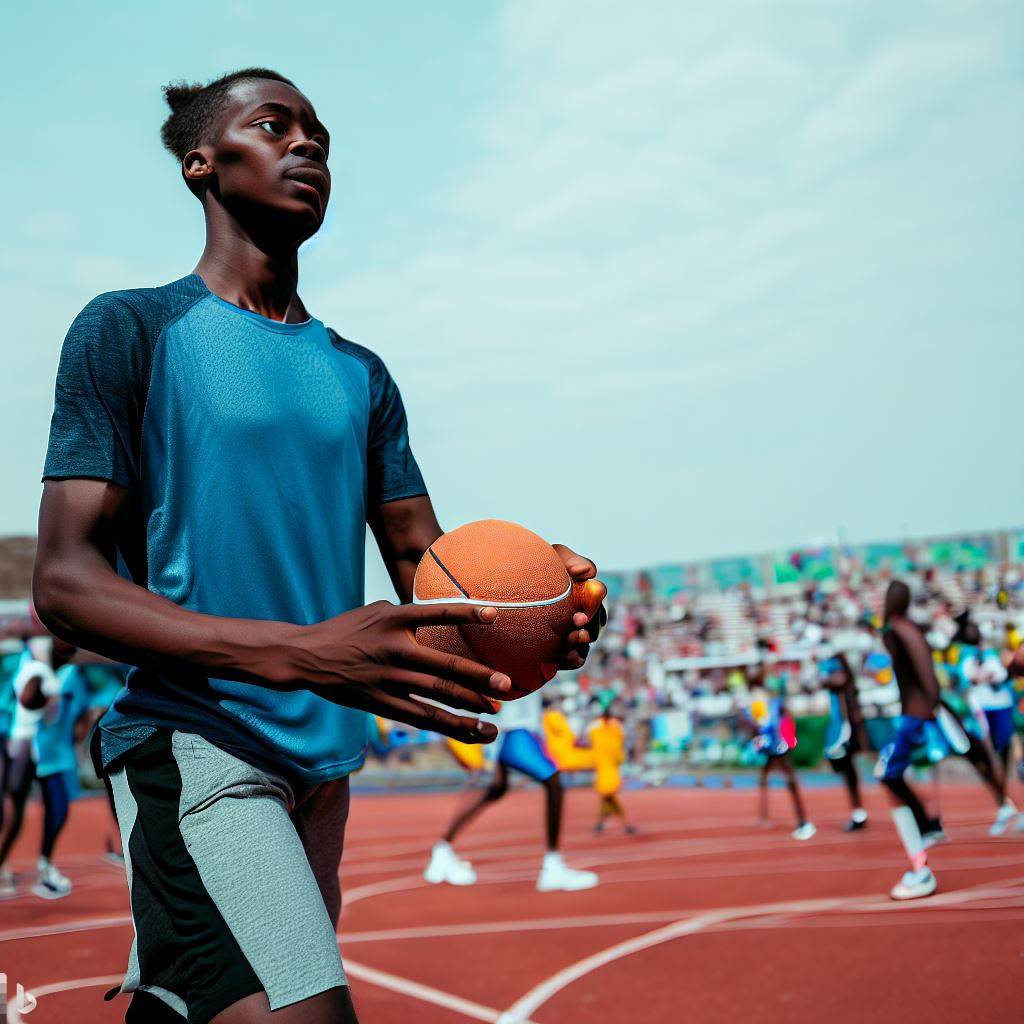Introduction
Coaches play a vital role in Nigerian sports. They are responsible for shaping and developing athletes into world-class competitors.
Their impact on sports performance is significant.
Therefore, understanding the role of coaches in Nigerian sports is crucial.
This topic is important because coaches are instrumental in the success of Nigerian athletes.
They form an integral part of the sports ecosystem, and their contribution cannot be understated.
By understanding their role, we can appreciate their value, and this can lead to greater support and investment in sports coaching.
Nigerian sports have a rich and diverse history.
The country has produced successful athletes in various disciplines, including football, athletics, basketball, and boxing.
However, Nigerian sports have suffered from a lack of investment and infrastructure, leading to underperformance at international competitions.
Despite these challenges, Nigerian sports have continued to thrive, thanks to the dedication and hard work of athletes and their coaches.
Definition and Explanation of Coaching
Coaching is a process that involves assisting and guiding individuals or teams to achieve their desired goals.
It is a profession that is usually focused on enhancing an individual’s performance and maximizing their potential.
Coaching can be applied in several fields, including sports, business, and personal development.
Definition of Coaching
Coaching is a profession that involves assisting individuals or teams to achieve their desired goals through guidance, support, and encouragement.
According to the International Coach Federation (ICF), coaching is defined as partnering with individuals in a thought-provoking and creative process that inspires them to maximize their personal and professional potential.
Explanation of Coaching in Sports
In sports, coaching is a crucial element that can determine the success or failure of a team or an individual athlete.
A coach is responsible for developing and implementing training programs that improve the skills, abilities, and performance of athletes.
Coaching in sports involves providing guidance, motivation, and feedback to athletes, as well as analyzing and strategizing during competitions to maximize their chances of winning.
Coaches in sports also play a vital role in shaping the character of athletes and instilling values such as teamwork, discipline, and sportsmanship.
They are responsible for creating a positive team culture, managing conflicts, and fostering an environment that promotes growth and development.
Importance of Coaches in Sports
Coaches are essential in sports for several reasons:
- They enhance the performance of athletes: Coaches are responsible for improving the skills and abilities of athletes through training, feedback, and guidance. They help athletes to develop their strengths and overcome their weaknesses, thereby enhancing their performance.
- They provide motivation and support: Coaching involves providing emotional support, encouragement, and motivation to athletes. Coaches help athletes to set goals and work towards achieving them. They also provide a listening ear and offer advice and guidance to athletes who may be struggling.
- They facilitate the development of character: Coaches have a significant influence on the character of athletes. They instill values such as teamwork, discipline, respect, and sportsmanship in athletes, which are essential for success both on and off the field.
- They contribute to the success of the team: Coaches are responsible for the overall performance of the team. They strategize during competitions, make adjustments during games, and manage conflicts to ensure that the team works cohesively towards a common goal.
- They promote growth and development: Coaches create an environment that promotes growth and development. They provide opportunities for athletes to learn, develop new skills, and improve their performance. They also provide feedback and guidance that helps athletes to improve continuously.
In essence, coaching is a vital element in sports that enhances the performance of athletes, develops their character, and contributes to the success of the team.
Coaches play a crucial role in creating a positive team culture, managing conflicts, and fostering an environment that promotes growth and development.
An excellent coach is not just a trainer but also a mentor, motivator, and guide who inspires athletes to achieve their full potential.
Read: Training Programs for Aspiring Athletes in Nigeria
The Role of Coaches in Nigerian Sports
Coaches are an integral part of Nigerian sports.
They bring a unique set of skills and expertise that enable athletes to reach their full potential. In this section, we will discuss the various roles coaches play in Nigerian sports.
Coach Selection
- Coaches are selected based on their knowledge, experience, and ability to work with athletes.
- Coaches are expected to have a proven track record of success in their field.
- The selection process is rigorous and involves interviews, background checks, and reference checks.
- The goal is to find coaches who can lead teams to victory and develop athletes into champions.
Training and Preparing Athletes
- Coaches are responsible for designing training programs that are tailored to the needs of each athlete.
- They develop workout plans that focus on strength, endurance, and agility.
- Coaches also prepare athletes mentally, teaching them to stay focused and remain calm under pressure.
- They help athletes set goals and monitor their progress, making adjustments as needed.
Providing Technical and Tactical Support
- Coaches are experts in the technical aspects of their sport.
- They provide athletes with feedback on their technique and form, helping them improve their skills.
- Coaches also develop game plans that are tailored to their opponents, helping athletes adapt to different situations on the field.
- They analyze video footage of practices and games, identifying areas that need improvement.
Creating a Winning Culture
- Coaches play a critical role in creating a winning culture.
- They instill a sense of discipline and work ethic in their athletes, teaching them to push themselves to the limit.
- Coaches also foster a sense of teamwork and encourage athletes to support and encourage each other.
- By creating a positive and competitive atmosphere, coaches help athletes perform at their best.
Career Development
- Coaches are invested in the careers of their athletes.
- They provide guidance and advice on career development, helping athletes navigate the challenges of their sport.
- Coaches help athletes identify opportunities for growth and advancement, working with them to set goals and develop a plan of action.
- They also connect athletes with mentors and other professionals who can help them succeed.
Motivating Athletes
- Coaches are responsible for motivating their athletes.
- They create an environment that inspires athletes to push themselves to new heights.
- Coaches use a variety of techniques to keep athletes motivated, including positive reinforcement, goal setting, and visualization.
- They also provide emotional support, helping athletes deal with the stress and pressure of competition.
In addition, coaches play a critical role in Nigerian sports. They are responsible for selecting, training, and preparing athletes for competition.
Coaches provide technical and tactical support, create a winning culture, and help athletes develop their careers. They also motivate athletes, helping them perform at their best.
Read: The Economic Impact of Sports in Nigeria

Challenges Faced by Coaches in Nigerian Sports
Coaching is a crucial aspect of sports development, and coaches have a significant role to play in ensuring that athletes achieve their full potential.
However, coaches in Nigeria face several challenges that hinder their ability to deliver and achieve success. Some of the notable challenges faced by coaches in Nigerian sports include:
Lack of Adequate Facilities
- Coaches in Nigeria often struggle with inadequate facilities such as training grounds, equipment, and amenities.
- This limitation often undermines their ability to prepare athletes adequately for competitions and hinders their overall development.
- Furthermore, the lack of adequate facilities also puts athletes at risk of injury and other health challenges.
- With limited access to quality facilities, coaches find it challenging to develop athletes to their full potential.
Lack of Adequate Resources
- Another major challenge faced by coaches in Nigeria is the lack of adequate resources.
- Resources such as funding, infrastructure, and equipment are vital for sports development and athlete improvement.
- However, coaches in Nigeria often find themselves struggling with limited resources, which makes it challenging for them to achieve their goals.
- The lack of adequate resources ultimately affects the quality of coaching that athletes receive and stifles the development of sports in the country.
Financial Challenges
- Coaches in Nigeria often struggle with financial challenges, which significantly impact their ability to deliver quality coaching services.
- The low financial remuneration paid to coaches often leads to low morale and motivation, which ultimately affects their overall performance.
- Without adequate financial support, coaches find it challenging to sustain themselves and maintain their commitment to coaching athletes.
- Financial challenges also affect the ability of coaches to travel and attend training programs that could help them improve their skills and knowledge.
Poor Remuneration
- Coaches in Nigeria face poor remuneration, which affects their motivation and commitment to delivering quality coaching services.
- Despite the critical role that coaches play in sports development, they often receive low salaries and benefits that do not reflect their contribution to the growth of sports in the country.
- This situation leaves many coaches struggling to make ends meet, leading to job dissatisfaction and high rates of turnover.
Lack of Support from Fans and Sports Administrators
- Coaches in Nigeria also face challenges with the lack of support from fans and sports administrators.
- Often, coaches have to deal with criticism and pressure from fans and administrators who do not understand the complexities of their role.
- The lack of support from key stakeholders makes it challenging for coaches to make informed decisions and develop athletes to their full potential.
- Furthermore, the lack of support from fans and administrators also affects the confidence of the coach and athletes, ultimately impacting their performance on the field.
Essentially, coaches in Nigerian sports face several challenges that must be addressed to facilitate sports development in the country.
Adequate facilities and resources are essential for the delivery of quality coaching services, while financial remuneration and support from stakeholders are critical for their morale and motivation.
Without addressing these challenges, Nigerian sports will continue to struggle, and athletes will not achieve their full potential.
The Future of Coaching in Nigerian Sports
Coaching is an essential aspect of sports and a vital part of the development of athletes.
The future of Nigerian sports is heavily dependent on the quality of coaching available to athletes, and there are various ways to improve the quality of coaching in Nigeria.
Therefore, this section will explore some of the ways in which coaching in Nigeria can be improved to ensure better sports development in the future.
The Need for Support and Investment
One of the most significant challenges faced by coaches in Nigeria is the lack of government support and investment in sports development.
For Nigerian sports to thrive, there needs to be a consistent investment in sports infrastructure, facilities, athlete development programs, and coaching education.
Establishing sports academies, providing financial incentives, and developing talent identification programs can help identify and engage young athletes early, providing them with the necessary support to pursue a career in sports.
A systematic approach will help lay a solid foundation for the development of Nigerian sports and provide coaches with opportunities for growth.
Professionalism and Capacity Building
Coaching professionalism is essential in ensuring athletes’ proper development, and it is imperative that coaches have the necessary knowledge, training, and certification to lead athletes effectively.
Most coaches in Nigeria lack access to coaching education, which has led to sub-standard coaching practices.
Therefore, there is an urgent need to develop and implement a coaching education program that caters to coaches across all levels.
The key to building capacity among coaches is to provide opportunities for career advancement, such as attending coaching conferences, seminars, and workshops.
Encouraging coaches to gain knowledge through online courses and international exchange programs is also a step in the right direction.
Attracting and Retaining Talent
Coaches play a crucial role in attracting and retaining talent in Nigerian sports. International coaches and players can bring a wealth of experience and expertise to the sports community in Nigeria.
It is essential to create an environment that attracts international athletes and coaches to Nigerian sports, and this can be achieved by ensuring competitive salaries, adequate facility infrastructure, and financial incentives for achievements.
Retaining talent is equally important as attracting them, and this can be done by offering continuous education to the coaches, training, and creating a healthy working environment conducive for athletes and coaches.
Developing Synergy with Stakeholders
Another way to improve the quality of coaching in Nigeria is through effective partnerships and collaborations with relevant stakeholders.
These stakeholders include sports associations, schools, and colleges, government agencies, and private sector organizations.
Developing relationships with these stakeholders can help coaches gain access to resources, training, and technology, thus improving their skills and knowledge.
Besides, it will provide them with opportunities to collaborate on athlete development programs and share best practices with one another.
In summary, coaching is critical to the growth and development of Nigerian sports.
To ensure a prosperous future for sports in Nigeria, there needs to be consistent investment in sports infrastructure, facilities, athlete development programs, and coaching education.
This can be achieved through developing coaching professionalism, attracting and retaining talent and developing strategic partnerships and collaborations with relevant stakeholders.
By implementing these strategies, Nigerian sports coaches can ensure that the country continues to produce world-class athletes who can compete on the international stage.
Read: Inspiring Stories of Successful Nigerian Athletes
Conclusion
A solid conclusion is essential to wrap up all the points discussed in the previous sections. Here is a recap of the main points in understanding the role of coaches in Nigerian sports.
Coaches are responsible for not only training and guiding athletes but also serving as mentors and role models. They play a significant part in development and success, especially at the grassroots level.
The importance of coaches in Nigerian sports cannot be overstated. They help to identify, develop and nurture young talents.
The success of any sports team is a testament to the efforts of the coaches who have trained and worked with the athletes. They are the unsung heroes of Nigerian sports.
If we want to see better results in Nigerian sports, then we need to provide better support and investment for coaches.
This is a call to action for sports stakeholders, government officials, and private organizations to prioritize the development of sports coaches in Nigeria.
By doing so, we will be building a brighter future for Nigerian sports and contributing to national development.




